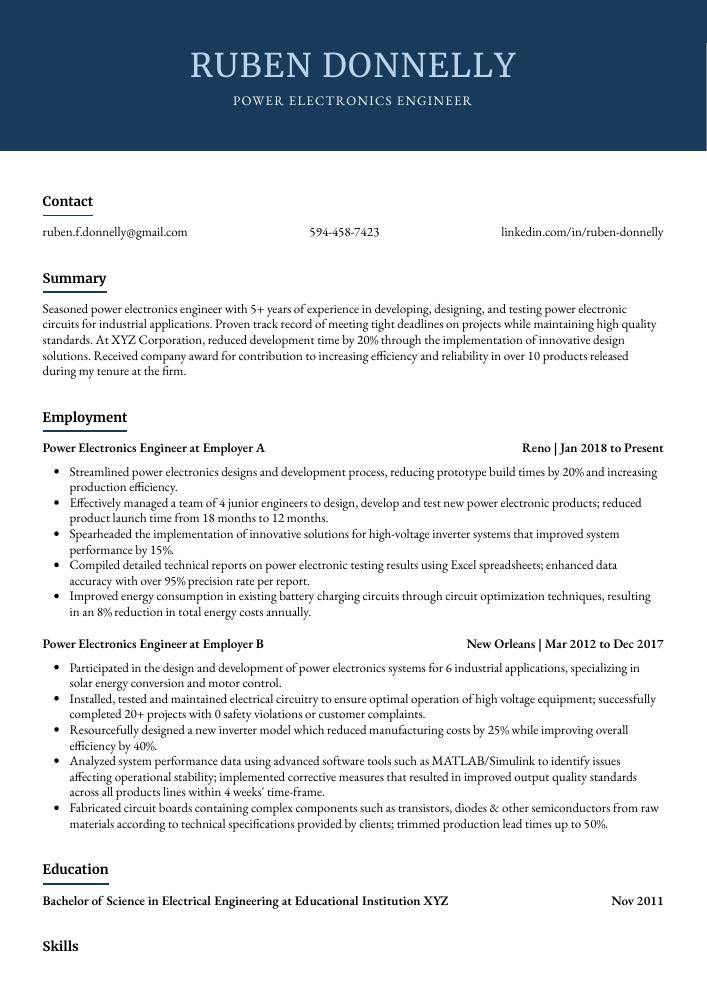Power Electronics Engineer Resume Guide
Power Electronics Engineers design, develop and test electronic components used for power conversion in consumer electronics, automotive systems and industrial applications. They create efficient solutions to ensure the safe operation of electrical circuits while optimizing performance.
Your expertise in power electronics engineering makes you the perfect candidate for any job. But employers won’t know who you are unless they see a resume that stands out from the rest. Make sure to highlight your achievements and talents on paper to get noticed by potential recruiters.
This guide will walk you through the entire process of creating a top-notch resume. We first show you a complete example and then break down what each resume section should look like.
Table of Contents
The guide is divided into sections for your convenience. You can read it from beginning to end or use the table of contents below to jump to a specific part.
Power Electronics Engineer Resume Sample
Ruben Donnelly
Power Electronics Engineer
[email protected]
594-458-7423
linkedin.com/in/ruben-donnelly
Summary
Seasoned power electronics engineer with 5+ years of experience in developing, designing, and testing power electronic circuits for industrial applications. Proven track record of meeting tight deadlines on projects while maintaining high quality standards. At XYZ Corporation, reduced development time by 20% through the implementation of innovative design solutions. Received company award for contribution to increasing efficiency and reliability in over 10 products released during my tenure at the firm.
Experience
Power Electronics Engineer, Employer A
Reno, Jan 2018 – Present
- Streamlined power electronics designs and development process, reducing prototype build times by 20% and increasing production efficiency.
- Effectively managed a team of 4 junior engineers to design, develop and test new power electronic products; reduced product launch time from 18 months to 12 months.
- Spearheaded the implementation of innovative solutions for high-voltage inverter systems that improved system performance by 15%.
- Compiled detailed technical reports on power electronic testing results using Excel spreadsheets; enhanced data accuracy with over 95% precision rate per report.
- Improved energy consumption in existing battery charging circuits through circuit optimization techniques, resulting in an 8% reduction in total energy costs annually.
Power Electronics Engineer, Employer B
New Orleans, Mar 2012 – Dec 2017
- Participated in the design and development of power electronics systems for 6 industrial applications, specializing in solar energy conversion and motor control.
- Installed, tested and maintained electrical circuitry to ensure optimal operation of high voltage equipment; successfully completed 20+ projects with 0 safety violations or customer complaints.
- Resourcefully designed a new inverter model which reduced manufacturing costs by 25% while improving overall efficiency by 40%.
- Analyzed system performance data using advanced software tools such as MATLAB/Simulink to identify issues affecting operational stability; implemented corrective measures that resulted in improved output quality standards across all products lines within 4 weeks’ time-frame.
- Fabricated circuit boards containing complex components such as transistors, diodes & other semiconductors from raw materials according to technical specifications provided by clients; trimmed production lead times up to 50%.
Skills
- Circuit Design
- Power Electronics
- Control Systems
- Electrical Engineering
- DC/AC Power Systems
- Power Conversion
- Power Semiconductors
- Motor Control
- Digital Signal Processing
Education
Bachelor of Science in Electrical Engineering
Educational Institution XYZ
Nov 2011
Certifications
Certified Power Electronics Professional
IEEE Power Electronics Society
May 2017
1. Summary / Objective
A resume summary/objective is the first thing a hiring manager will read, so it is important to make sure it stands out. As a power electronics engineer, you can use this section to highlight your technical skills and experience with circuit design, signal processing techniques, and embedded systems development. You could also mention any certifications or awards you have earned in the field of power electronics engineering.
Below are some resume summary examples:
Dependable and detail-oriented Power Electronics Engineer with 4+ years of experience in the design, development, and testing of power electronics products. At XYZ Technologies, designed a high efficiency DC-DC converter that resulted in a 40% reduction in energy consumption. Received an award for developing innovative solutions to reduce cost while meeting customer requirements. Focused on delivering reliable and efficient performance through continuous research and implementation of new technologies.
Passionate power electronics engineer with 5+ years of experience in developing and optimizing power supply solutions. Adept at designing, analyzing, and testing various applications for consumer products such as medical equipment, automobiles, robotics systems, etc. Proven track record of reducing cost by 15% while increasing efficiency by 20%. Looking to join ABC Tech to use my expertise to create innovative solutions that can benefit society.
Hard-working power electronics engineer with 10+ years of experience in the design and implementation of power electronic systems. Skilled at leading high-performance teams to develop successful product designs that meet customer specifications. Successfully implemented over 20 custom projects while working closely with clients to ensure satisfaction. Proven track record for improving efficiency, reducing costs, and increasing profits.
Skilled power electronics engineer with 5+ years of experience in the design and development of power converters, inverters, transformers, and other electrical devices. Proven ability to troubleshoot issues quickly while maintaining a high level of safety. Looking to join ABC Company as an Electronics Engineer where my technical knowledge can be utilized for creating innovative solutions that will help drive growth.
Accomplished power electronics engineer with 5+ years of experience in design, development and testing of power electronic systems. Highly skilled at using a variety of tools including MATLAB/Simulink, PSPICE and LTspice to develop simulations for circuits. Experienced in designing high voltage inverters (HVIs) as well as low-voltage DC-DC converters; adept at troubleshooting problems related to HVI circuitry.
Well-rounded Power Electronics Engineer with 5+ years of experience designing and developing circuit boards for various applications. Proven track record of creating cost-effective solutions that meet customer needs while ensuring the highest quality standards. Seeking to leverage strong knowledge in power electronics, microcontrollers, and digital signal processing at ABC Tech to create innovative products.
Diligent power electronics engineer with 8+ years of experience in the design and development of power conversion systems. Experienced in creating high-efficiency, cost-effective solutions for a variety of industries, including automotive, medical device manufacturing, renewable energy generation and more. Demonstrated ability to develop detailed schematics and efficiently troubleshoot system issues.
Amicable power electronics engineer with 5+ years of experience in design and development, testing, maintenance, and troubleshooting. Proven track record of designing high-performance power systems for a variety of applications from industrial to consumer products. Seeking to join ABC Tech as the next Power Electronics Engineer to help build innovative solutions that meet customer needs.
2. Experience / Employment
In the experience section, you should list your employment history in reverse chronological order. This means that the most recent job goes at the top of this section.
When writing out what you did for each role, stick to bullet points; doing so allows the reader to digest information quickly and easily. You want to provide detail when talking about what you did and any results achieved as a result of your work.
For example, instead of saying “Developed power electronics,” you could say, “Designed high-efficiency DC/DC converters with up to 98% efficiency using advanced switching techniques.”
To write effective bullet points, begin with a strong verb or adverb. Industry specific verbs to use are:
- Designed
- Programmed
- Simulated
- Fabricated
- Analyzed
- Installed
- Troubleshot
- Optimized
- Monitored
- Tested
- Commissioned
- Calibrated
- Assembled
- Documented
- Debugged
Other general verbs you can use are:
- Achieved
- Advised
- Assessed
- Compiled
- Coordinated
- Demonstrated
- Developed
- Expedited
- Facilitated
- Formulated
- Improved
- Introduced
- Mentored
- Participated
- Prepared
- Presented
- Reduced
- Reorganized
- Represented
- Revised
- Spearheaded
- Streamlined
- Structured
- Utilized
Below are some example bullet points:
- Assessed power electronics system requirements and designed circuits to meet performance goals, reducing power consumption by 30% in the last project.
- Developed control algorithms for various motor drives, regulating speed and torque of motors with a high degree of accuracy (+/- 0.5%).
- Troubleshot circuit designs using oscilloscopes, spectrum analyzers & other tools; successfully identified root cause of issues within 5 hours on average across 15+ projects.
- Proficiently maintained electrical schematics/diagrams, wiring diagrams and bill-of-material (BOM) documentation according to industry standards while ensuring compliance with safety regulations throughout all stages of development process.
- Utilized specialized software such as MATLAB/Simulink to simulate real-world conditions when testing new systems; increased efficiency by 10%.
- Prepared and designed electrical power control systems for various products, resulting in a 20% reduction in energy consumption and improved product functionality.
- Demonstrated expertise in programming microprocessors to support the development of embedded software, cutting down debugging time by 25%.
- Programmed analog circuits using PSpice/LTspice simulation tools, thereby developing more efficient designs with increased reliability ratings.
- Structured test plans and conducted tests on new electronic components to ensure their quality before launch; successfully identified issues within 2 days that would have otherwise cost $5K+ if not detected earlier.
- Competently analyzed circuit diagrams and schematics while troubleshooting any technical faults or malfunctions related to power electronics equipment; resolved all customer-reported problems within 24 hours on average.
- Formulated power electronic design solutions, resulting in a 25% reduction of energy consumption and improved reliability for 15+ products.
- Simulated various power electronics designs using MATLAB/Simulink to ensure electrical integrity, performance optimization and cost reductions; successfully designed 8 high-efficiency inverters within 3 months.
- Coordinated the development process with cross-functional teams including PCB designers, mechanical engineers, production personnel & quality control specialists to deliver projects on time & budget with no defects or delays reported by customers.
- Diligently tested prototypes under different operating conditions (load current up to 100A) in accordance with safety regulations; reduced product evaluation time by 30 hours per project thanks to thoroughness and accuracy of tests performed.
- Presented technical papers at two industry conferences highlighting the latest advancements made in power electronics engineering that resulted from research studies conducted over 6 years period.
- Tested and validated the performance of over 100 power electronic devices, resulting in a 15% reduction in power consumption on average.
- Reorganized and upgraded existing control systems to ensure compatibility with newly developed components; led to an increase of 5x in processing speeds for all projects.
- Monitored data from various sources (e.g., current draw measurements etc.) to identify any anomalies or malfunctions that may occur with these electrically-driven products; minimized downtime by 30%.
- Actively participated in design reviews which resulted in improved electrical safety features across 10+ designs as well as cost savings up to $10,000 per month through component optimization initiatives.
- Expedited the development cycle for multiple high-profile projects by designing prototypes within tight deadlines; reduced overall development time by 20 hours per project on average.
- Optimized power electronics systems to reduce energy consumption by 20%, while increasing efficiency and reliability.
- Commissioned over 30 power supply units, including inverters, converters, rectifiers and UPSs; improved system performance by 15% in the long-term.
- Reduced development time of new products from 10 months to 8 months through efficient design methodologies & troubleshooting techniques.
- Introduced innovative engineering solutions for challenging projects resulting in a reduction of cost per unit by $500 on average.
- Meticulously tested all components using simulation software prior to installation; achieved zero defects rate with 100% accuracy upon completion of each project milestone within schedule constraints.
- Reliably designed, developed and tested power electronics systems for 3+ industrial automation projects; increased efficiency by 20% while reducing energy consumption by 17%.
- Facilitated the installation of over 50 automated power controllers in local factories, troubleshooting any issues that arose during commissioning to ensure optimal performance.
- Revised schematics and circuit diagrams of existing components before creating new prototypes; successfully reduced development time from 4 months to 6 weeks.
- Documented all design specs and engineering processes meticulously throughout the project life cycle; improved future reference capability for both clients and colleagues alike.
- Assembled electronic boards with active & passive components according to specifications provided within tight deadlines without sacrificing quality or safety standards.
- Mentored and guided a team of 4 junior engineers in the development of 200+ power electronics components, resulting in a 20% reduction in project timelines.
- Independently designed and tested over 70 high-voltage switching circuits for automotive applications to meet strict safety standards; reduced defect rate by 15%.
- Designed customized circuit boards with embedded microprocessors to regulate energy consumption and increase system efficiency; improved product performance by 10%.
- Debugged hardware problems from both software and electrical perspectives within constrained deadlines, increasing productivity on all assigned projects by 45%.
- Calibrated systems for optimal operation using oscilloscope readings and various measurement tools, ensuring that operations ran smoothly without any glitches or delays.
- Accurately designed, simulated and tested more than 20 power electronics circuits for high-speed applications; achieved a 99% success rate in engineering testing.
- Advised the R&D team on selecting appropriate components and materials to ensure that all designs met customer specifications within budget constraints; reduced overall project costs by 5%.
- Achieved 95% efficiency ratings with every design while also meeting ISO 9001 standards; improved energy utilization levels of products developed by 10%.
- Represented the company at industry events such as conferences, workshops & seminars held overseas, gaining valuable knowledge about emerging trends in power electronics technology which was used to improve existing product lines.
3. Skills
Skill requirements will differ from employer to employer – this can easily be determined via the job advert. Organization ABC may be looking for experience with power electronics and organization XYZ may require knowledge of embedded systems.
It is essential to tailor the skills section of your resume to each job you are applying for, as many employers use applicant tracking systems which scan resumes for certain keywords before passing them on to a human. You want these programs to recognize that you possess the necessary qualifications so that your application can make it through this first stage in the recruiting process.
In addition, don’t forget about elaborating on some of your most important skills in other sections such as summary or work experience; this will help demonstrate why you would be an ideal candidate for their role.
Below is a list of common skills & terms:
- Analog Circuit Design
- Circuit Design
- Control Systems
- DC/AC Power Systems
- Digital Signal Processing
- Electrical Engineering
- Motor Control
- Power Conversion
- Power Electronics
- Power Semiconductors
4. Education
Including an education section on your resume will depend on how far along you are in your career. If you just graduated and have no work experience, mention the courses and subjects related to power electronics engineering that you studied below your resume objective. However, if you have significant work experience with plenty of accomplishments to showcase, it might be better to omit the education section altogether.
If an education section is included, try to highlight any relevant coursework or projects completed during college that relate directly to a power electronics engineer role.
Bachelor of Science in Electrical Engineering
Educational Institution XYZ
Nov 2011
5. Certifications
Certifications are a great way to demonstrate your expertise in a certain field. They show potential employers that you have taken the time and effort to become certified in an area related to the job, which can give them confidence in your abilities.
If you are applying for a position where certifications are required or preferred, make sure they appear prominently on your resume. This will help hiring managers quickly identify if you possess the necessary qualifications for the role.
Certified Power Electronics Professional
IEEE Power Electronics Society
May 2017
6. Contact Info
Your name should be the first thing a reader sees when viewing your resume, so ensure its positioning is prominent. Your phone number should be written in the most commonly used format in your country/city/state, and your email address should be professional.
You can also choose to include a link to your LinkedIn profile, personal website, or other online platforms relevant to your industry.
Finally, name your resume file appropriately to help hiring managers; for Ruben Donnelly, this would be Ruben-Donnelly-resume.pdf or Ruben-Donnelly-resume.docx.
7. Cover Letter
Writing a cover letter is an important step in the job application process. It’s a document consisting of 2 to 4 paragraphs that provides recruiters with more information about you and your professional background.
Cover letters are not always required, but they can definitely give you an edge over other applicants if done right. They allow you to explain why you think you’re the best fit for the role and showcase your individual personality which helps create a lasting impression on hiring managers.
Below is an example cover letter:
Dear Emmanuel,
I am writing in response to your posting for a Power Electronics Engineer. As an experienced engineer with over 10 years of experience designing, developing, and testing power electronic systems, I am confident I will be a valuable asset to your organization.
My experience spans a variety of industries, including automotive, aerospace, consumer electronics, and renewable energy. I have designed power electronic converters for electric vehicles, aircraft generators, solar inverters, and LED drivers. I am knowledgeable in a variety of converter topologies and control methods, and have experience with simulations using SPICE-based tools such as LTspice and PLECS.
In addition to my engineering experience, I have also managed teams of engineers and technicians. I am familiar with project management methodologies such as Agile/Scrum and Kanban. My leadership skills would be an asset in coordinating projects between different teams within your organization.
I believe my skills and experience make me the perfect candidate for this position. I look forward to discussing how I can contribute to your team’s success in more detail during an interview. Thank you for your time and consideration.
Sincerely,
Ruben
Power Electronics Engineer Resume Templates
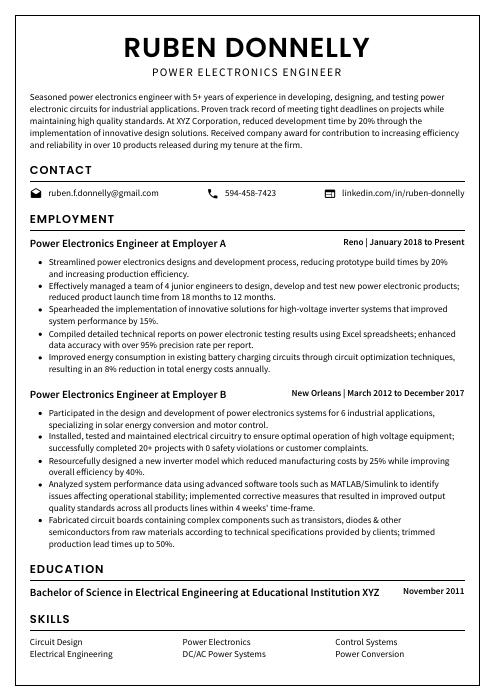 Cormorant
Cormorant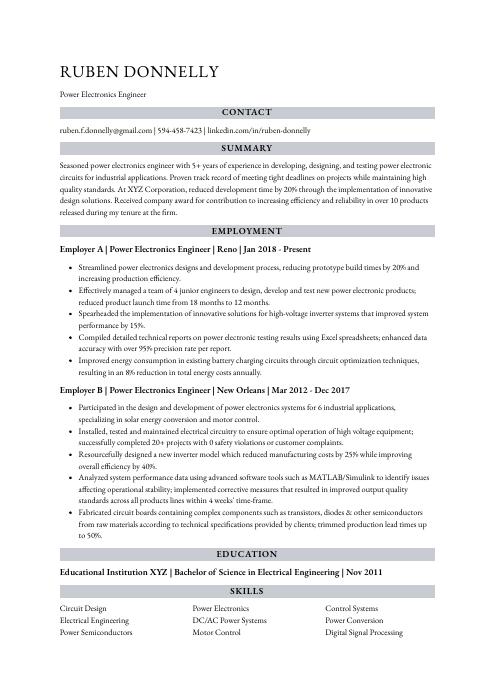 Numbat
Numbat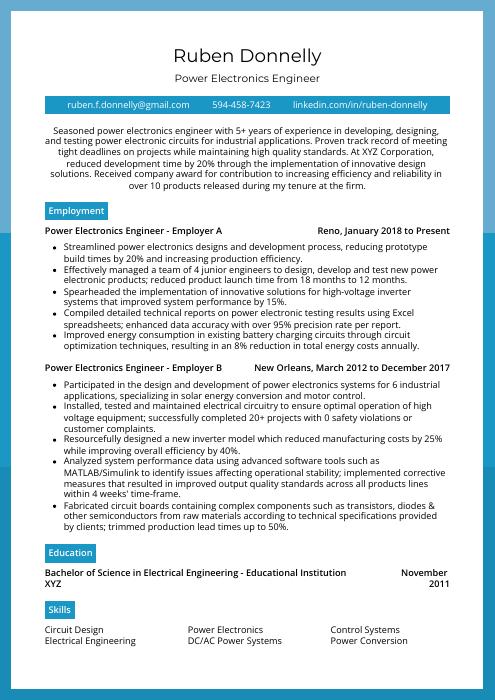 Rhea
Rhea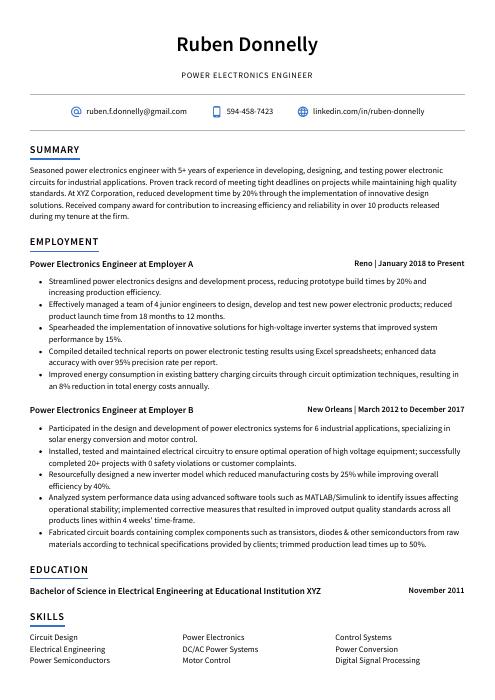 Axolotl
Axolotl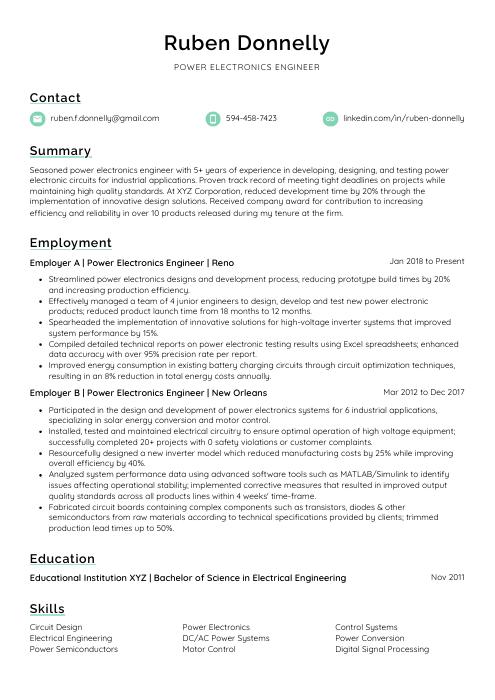 Lorikeet
Lorikeet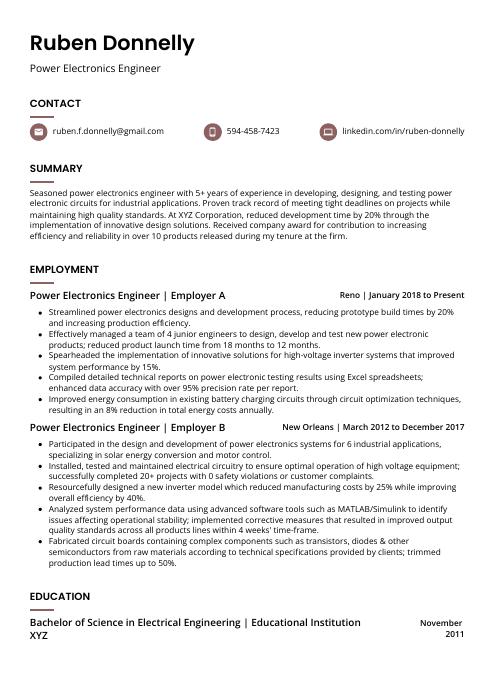 Fossa
Fossa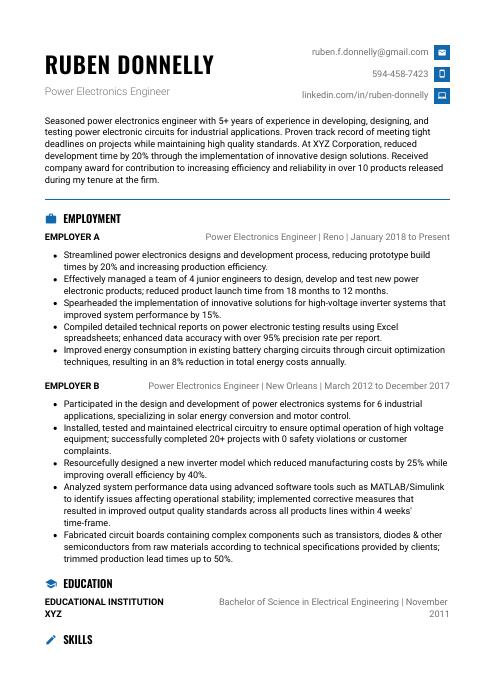 Echidna
Echidna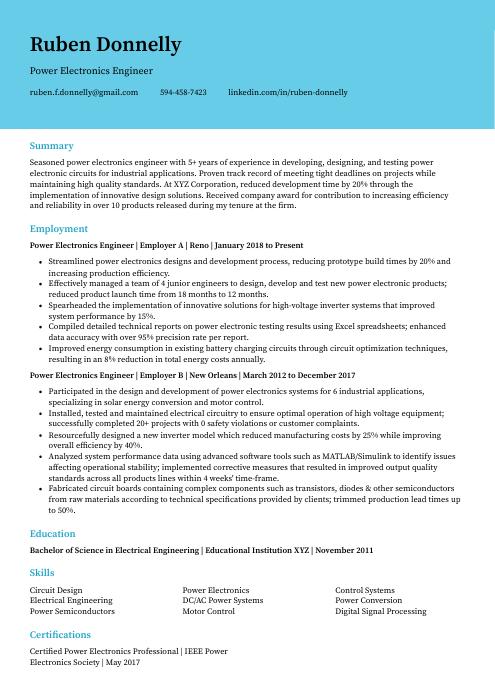 Dugong
Dugong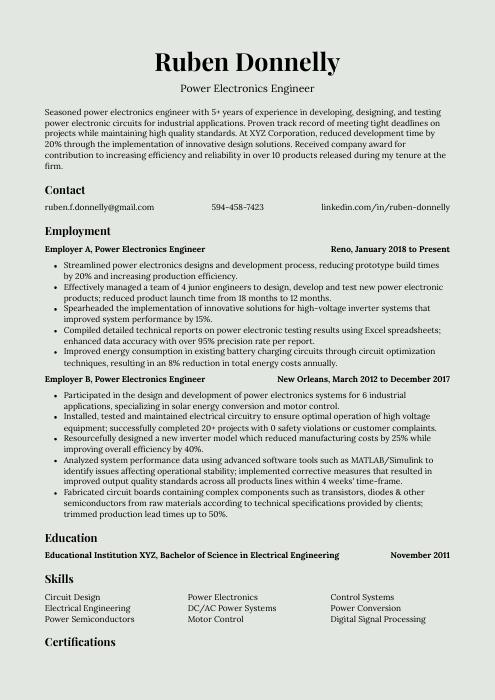 Saola
Saola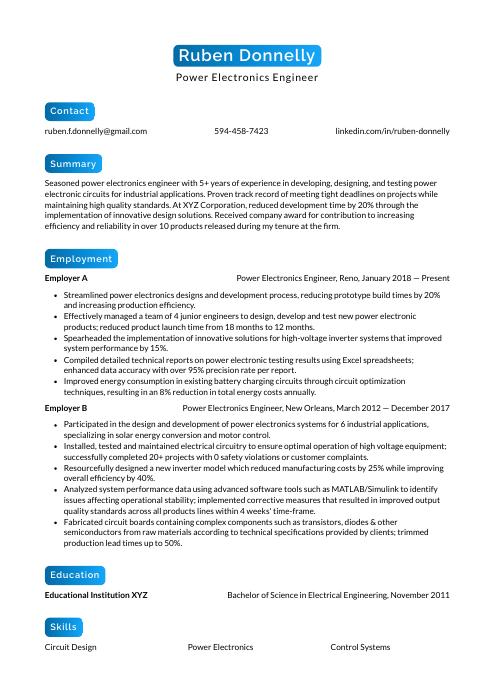 Kinkajou
Kinkajou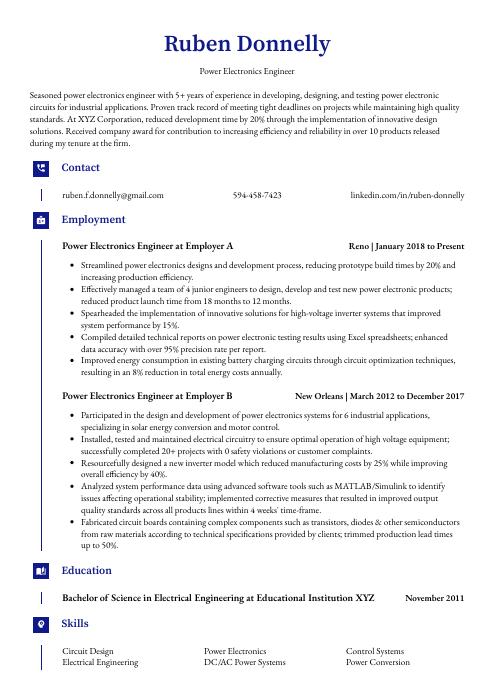 Gharial
Gharial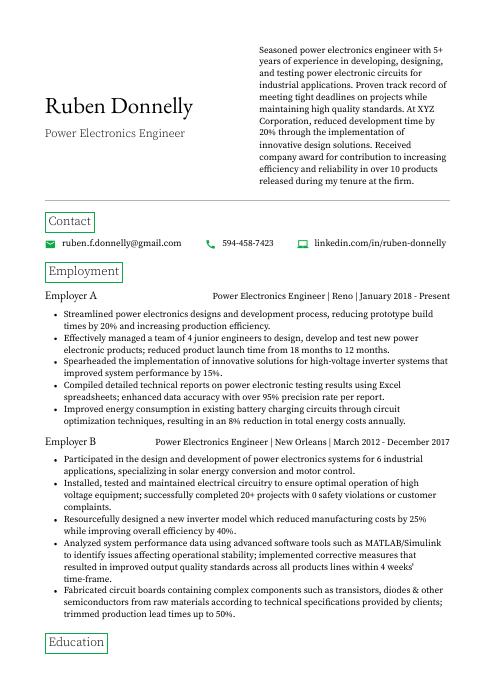 Quokka
Quokka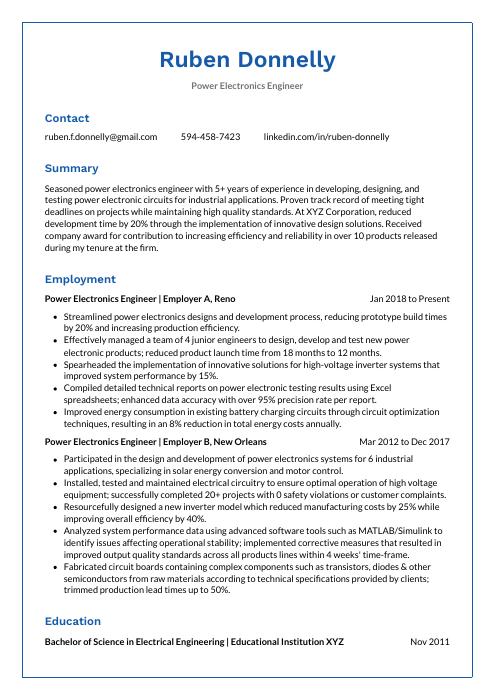 Markhor
Markhor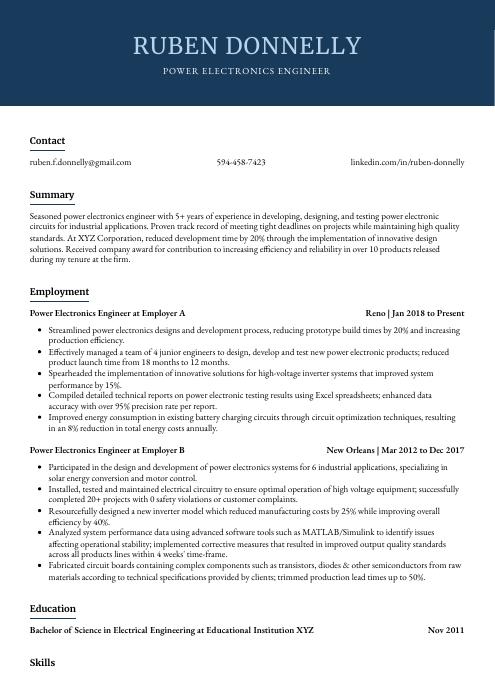 Bonobo
Bonobo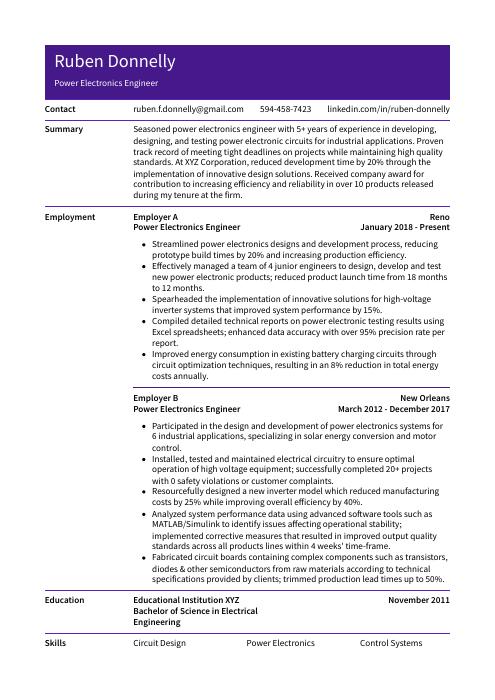 Pika
Pika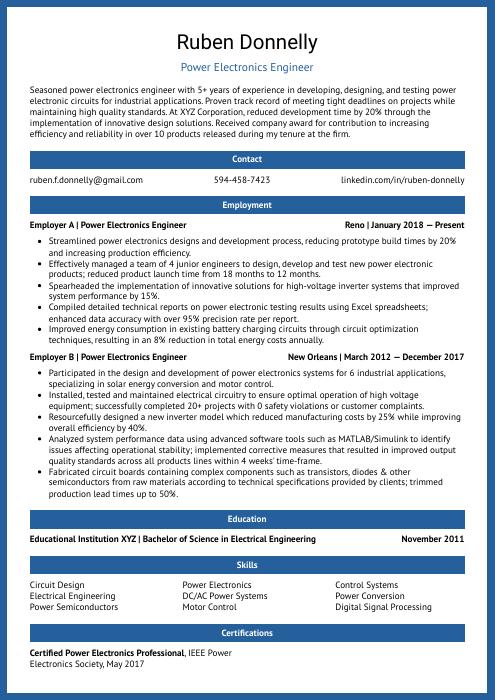 Ocelot
Ocelot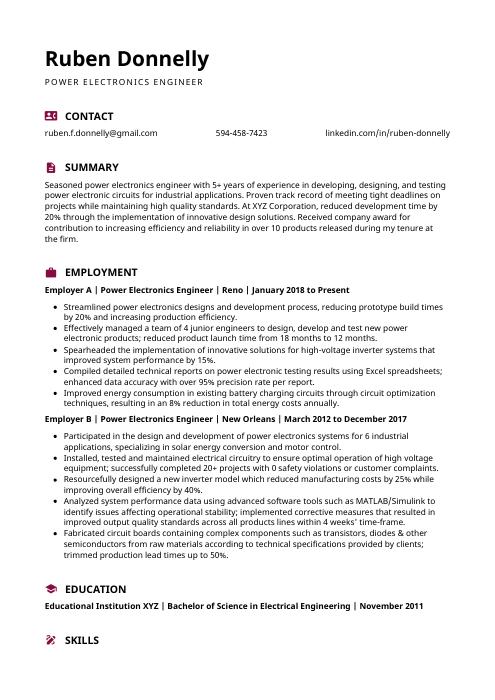 Hoopoe
Hoopoe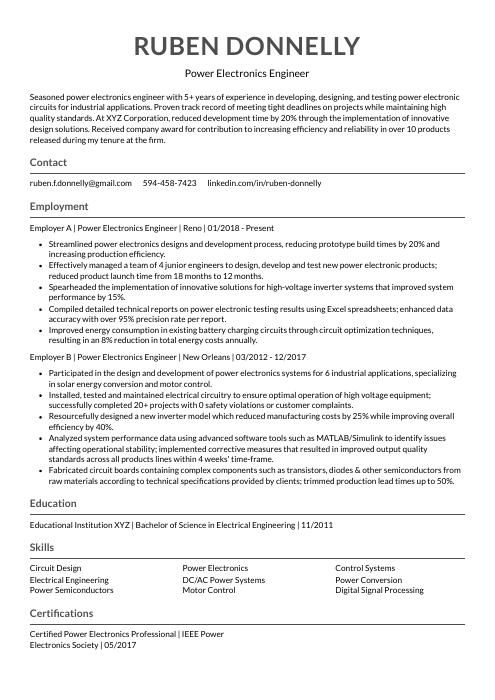 Indri
Indri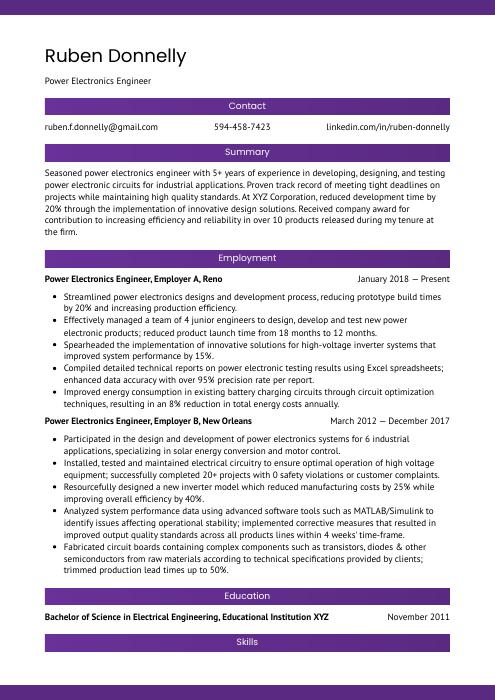 Jerboa
Jerboa Rezjumei
Rezjumei
